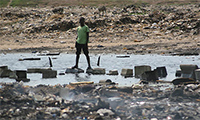Greenwash: Weee directive is a dreadful missed opportunity to clean up e-waste
An EU directive to clean up the electronic waste industry is not being operated or policed properly, and is often ignored completely by manufacturers
by Fred Pearce, The Guardian (UK)
 |
 |
 |
 |
| |
 |
|
| |
Discarded computers, televisions and other electronic waste often finds its way to India, west Africa, and China for 'recycling'.
© DanWatch and Consumers International |
|
 |
 |
 |
|
| |
25 June 2009 – Remember the charmingly named Weee directive from Brussels? That's Weee as in what to do with waste electronics goods like computers.
It is now two years since the waste electrical and electronic equipment directive came into force in the UK. The idea was to stop land-filling all those toxins in computers and to keep the computers in use as long as possible.
But the directive has proved to be a dreadful wasted opportunity. In fact, it is worse than that. Many believe that the directive has become a green light for sending ever more container loads of old computers for dismantling and "recycling" by child labour from west Africa to southern China. I have seen this "recycling" in action. It normally involves smashing stuff up with hammers and dunking choice bits into vats of acid to reclaim the metal.
I have been talking to Tony Roberts, the boss of Computer Aid International, the world's largest non-profit supplier of used computers to developing countries. He is one of the good guys. His 10-year-old outfit refurbishes old computers for re-use abroad, mostly in schools in Africa. It has shipped approximately 150,000 so far.
Computer Aid should have been a prime beneficiary of the directive, which says re-use is the best solution for old computers and recycling to harvest their materials is a second best. But he says none of the expected surge in people offering him old computers has happened.
That's a surprise. At least 4m computers are thrown away each year in Britain. Under the directive, manufacturers and retailers must take them back and arrange for their re-use or recycling. As a result, a plethora of brokers have emerged to take the computers off their hands and provide the paperwork showing that the computers are ending up somewhere safe.
But paperwork is often all it is. Yes, less electronic waste is going to landfills. But more stuff is not turning up for recycling (where slumping metals prices have been a problem) or for re-use. Where does it go?
One possibility is that even more computers are going abroad for dodgy recycling in China or India or Africa. The other is that there is a hidden "computer mountain" forming in warehouses across the country. Either way the directive is not being operated or policed properly, and many people are simply ignoring it altogether.
There are lots of people that might be blamed for this. But my money, in Britain at least, is on ministers at the Department for Business, Innovation and Skills.
According to the EU, under the directive "member states are required to ... collect information on an annual basis on the quantities and categories of electrical and electronic equipment places on the market, collected, re-used, recycled and recovered ... and on collected waste exported."
But Britain cannot produce those numbers because the brokers are not supplying it. And they are not supplying it because there is no compulsion on them to do it. According to Roberts that is because the business lobby successfully persuaded the government to water down requirements to track what happens to old computers.
The Environment Agency - which polices the directive in the UK - tells me there is no good data on what e-waste lands up where, particularly the e-waste from business. Last year the agency received reports on the fate of just 15,000 tonnes of commercial e-waste, less than a twentieth of the likely total. "There is just not enough incentive for people to report," says the agency's Adrian Harding. And, though there was a flurry of activity at the agency after a Greenpeace report on dodgy recycling in west Africa last year, there have been no successful prosecutions, either.
Roberts says Computer Aid could handle 10 times as many computers and find them good new homes, if only people would donate them. But right now, there is no incentive for making those donations.
Everybody knows the directive isn't working. According to an EU memo last December, only a third of the waste covered by the directive is "treated according to the legislation". Some 13% still goes to landfill and "the rest (54%) goes potentially to sub-standard treatment inside or outside the EU. Illegal trade to non-EU countries is still widespread."
The British government hardly seems to be pushing to fill the data gap. When launching a consultation exercise on how Britain operates the directive last December, it said one of its prime motivations was to "reduce the administrative burdens placed on business by simplifying the data reporting requirements".
Earlier this month the business secretary Lord Mandelson gave a lecture at the London School of Economics at which he argued that politics should be reformed on greener and less cynical lines. But he has a way to go before such claims sound like anything other than greenwash.
FAIR USE NOTICE. This document contains copyrighted material whose use has not been specifically authorized by the copyright owner. The Basel Action Network is making this article available in our efforts to advance understanding of ecological sustainability and environmental justice issues. We believe that this constitutes a 'fair use' of the copyrighted material as provided for in section 107 of the US Copyright Law. If you wish to use this copyrighted material for purposes of your own that go beyond 'fair use', you must obtain permission from the copyright owner.
More News
|